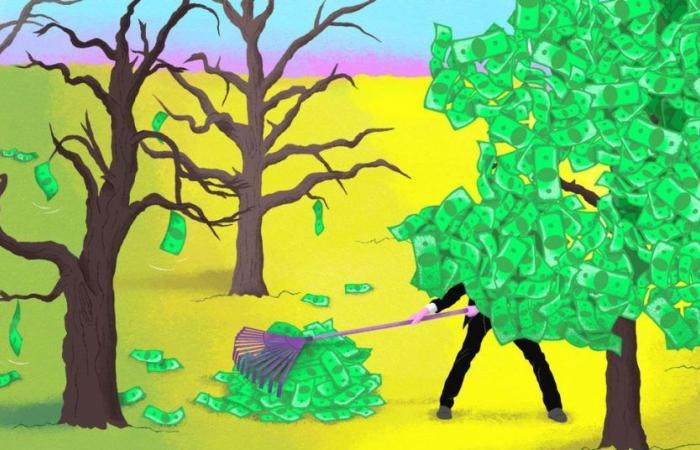Like those boxers who react when they are about to be knocked out, Javier Milei managed to overcome the worst political crisis of his administration with four victories that returned the initiative and they turned the one who left into one of his best weeks as president: May inflation below 5%, the half-sanction in the Senate of the Bases Law, the extension for one year of the swap with China and the IMF’s approval to the eighth quarterly review of the program that Martín Guzmán signed to refinance the 2018 megaloan to Mauricio Macri. If he blue Had it not jumped back to around $1,300 late Friday, it would have been the dream weekend to celebrate his first six months in power.
Each of these milestones had its costs, but the cloud in which they had put him raid internal that ejected Nicolás Posse and the food scandal in Capital Humano dissipated in a few hours. Not even the brutal repression and the hunt for protesters in front of Congress – which the PRO endorsed as if Patricia Bullrich were still at the head of the party – darkened the horizon again. At the bell and with an agonizing jump-off, minutes before taking off for Europe, Milei managed to reaffirm what was most important for the markets: that the situation did not get out of control.
What keeps ticking is time. With the honeymoon exhausted, one eighth of his term already elapsed, the President needs to show that the decline in inflation is sustained and that it was not at the cost of a massacre in terms of activity, as Peronism and the unions denounce. Now that the law was out, he was left with no “rats” to blame for the economic depression that his initial devaluation shock generated.
‘Toto’ Caputo took note and warned that “the era of the negative real rate is over.” It was a message to the IMF, which criticized the monetary policy of the first semester to liquefy fixed-term savings and migrate debt from the Central Bank to the Treasury. Without that guarantee he was not going to approve the disbursement of US$800 million. But it is also a way of plant in the business world the idea of turning a pagea watershed towards a second semester which is already beginning to form part of the urban mythology of the Creole right.
The problem is that Positive interest rates, the stagnant dollar and the delay in salaries after the summer shock are an impossible combo for the domestic market and SMEs., where 80% of employment is generated. And to that will be added the effects of the law, which is still unknown if it will come out with the changes of the Senate or as approved by the Deputies.
What will be your final tax cost? To what extent will a second round of spending adjustment be needed to compensate for the taxes that the wealthiest sectors will no longer pay? Will it really attract new investments thanks to the generous RIGI concessions, which far exceed taxes? These are key questions that were not answered on the premises. What if the regime’s incentives are taken advantage of by the companies that were still going to invest and there is not even a net increase in employment or production?
A report by the consulting firm Aleph Energy provides a clue to the latter. It shows that last year, oil company investments in upstream (hydrocarbon exploration and production) totaled US$11.8 billion. YPF is at the top, far away, with almost half of the total. For this year, disbursements of almost the same amount (US$11.4 billion) are planned. Aleph estimates that YPF will invest US$4,406 million, Panamerican Energy (of the Bulgheronis) 1,600 million, Vista (of Miguel Galuccio) 945 million, Pluspetrol 881 million, the French company Total 580 million, Tecpetrol (of Paolo Rocca) 523 million, Shell 491, CGC (of the Eurnekians) 366 million, Chevron 319 million and Pampa (of Mindlin) 239 million. All of them could benefit from the RIGI, which requires investing a floor of US$200 million in the selected sectors. If the tax burden is reduced by 10 points, as the ruling party conservatively estimates, the treasury will have given up more than a billion dollars in exchange for nothing. The disbursements were going to happen anyway.
From there up, the sky is the limit. And that is without counting the benefits that the generous money laundering included in the fiscal package also represents for big capital, nor the eventual businesses that arise from privatizations.
Transfers
It will be the second major transfer of this management from the lowest-income sectors to the wealthiest. The first was the one that generated the December devaluation, which pushed five million people below the poverty line and whose beneficiaries are beginning to appear in the public quarterly balance sheets presented to the National Securities Commission (CNV). The same thing that the high inflation regime of recent years did but much faster.
Telecom-Clarín, for example, increased its profits sixfold in real terms in the first quarter compared to the same period in 2023. Milei’s decree 302/24 served it, which annulled the 2020 decree that declared “essential public services” and regulated prices. internet, telephony and pay TV. The food companies Arcor (Pagani) and Molinos Río de la Plata (Perez Companc) increased their net results by 168% and 214% respectively, always discounting the effects of inflation. In the world of energy, all the electricity distributors stood out, Tecpetrol (improved its results by 629% in real terms) and Pampa (114%, more than double). The balance of Aeropuertos Argentina 2000, owned by the President’s former boss, also shines: its results grew by a real 401%.
Economist Claudio Lozano published a report this week on why these balance sheets turned out to be so large. In the case of food, he argues that “the repeal of the ‘Careful Prices’ program allowed large operators to capture wide profit margins through the oligopolistic fixing of food prices in the basic family basket.” Oil tankers benefited from the devaluation and “the release of the local price of a barrel of crude oil to align it with the international price.” To the laboratories “the abrupt increase in the price of medicines, well above the general price level of the economy.” In all cases Sales plummeted because salaries failed to keep pace. But profits fly because the margins more than compensate for that drop.
Banks also saw their profits rise exponentially. Galicia (Escasany, Ayerza and Braun) quadrupled them, from 58 thousand to 244 billion pesos in March 2024. Macro (Brito and Carballo) quintupled them and Santander tripled them. According to Marco Lavih, an economist at the Mirador de la Actualidad del Trabajo y la Economía (MATE) in Rosario, it is because it became cheaper for banks to fund themselves. “They are paying much less for the silver that they can use to buy treasury bonds and/or Central Bank repos that, although they yield less than before, are ‘cheaper’ for that same reason.”
dragons and galleys
Inflation promises to rise again in June. This is suggested by the increase in food last week, of 1.5%, which was measured by the consulting firm LCG after several weeks almost at zero due to the collapse in sales.
It will depend a lot on what happens with the dollar, for which there is good and bad news. The good thing is that Chinese communism saved Milei’s life and kicked off the payment of the US$4.9 billion that Argentina used from the swap enabled last year a year ahead.. The bad thing is that Producers still have not sold their grains, waiting for a new devaluation. As of June 5, only 17% of the harvest has been sold ‘with price’. At the same time last year, in the midst of a drought and with the prospect of a change in the rules of the game in their favor, they had already sold 21%.
Among the Chinese, Milei generates a mixture of fascination and perplexity similar to that aroused in the United States and Europe. They consider it a kind of spasm in the history of a young country that has not yet agreed on the optimal size of its public sector. “It happens to us too. In recent decades we have had moments of adjustment and moments of expansion of the State,” he explained to elDiarioAR an eastern diplomatic source. They do not give much importance to the hostility of his speech, which is laughed at by an ultra-pragmatic bureaucracy that considers the Cold War a thing of the past. What is not funny are his winks to the island of Taiwan. That’s what they want to talk about personally.
As a client, in any case, China has already begun to distance itself. So far this year it fell from second to fourth place as a destination for Argentine exports. Chile and the United States surpassed it. Brazil follows first, also challenged as “communist” by Milei, who nevertheless warmly thanked the government of Luiz Inácio Lula Da Silva last month, when he released the gas ship that allowed the CNG stations to be reactivated.
These are prejudices that are out of fashion in other latitudes, even in the midst of the advance of the extreme right. The most powerful CEOs in the United States, for example, did not hesitate to meet this Thursday with Donald Trump under the umbrella of the Business Roundtable, which in 2021 called on him to “end the chaos and facilitate the peaceful transition of power.” There were Tim Cook from Apple, Mary Barra from General Motors and Jamie Dimon from JP Morgan, among others. The newspaper Guardian He announced it like this: “Dangerous for democracy, good for profits. Are big companies willing to love Trump again?”
The triumph of the American conservative is Milei’s great geopolitical bet, who eagerly awaits Super Tuesday, November 5. Now that it has a law, it comes “based,” say the libertarians on the networks. The solidity of those foundations will be tested by the next storm that blows.
AB/DTC






